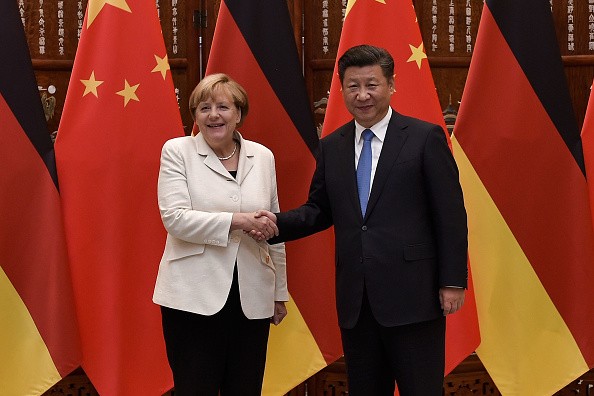China and the European Union (EU) are being forced to thaw their decade-long tensions and unite to push for free trade because of U.S. President Donald Trump policies and his "America First" mantra, the Straits Times reported.
Last week, Chinese President Xi Jinping and German Chancellor Angela Merkel agreed over a phone conversation "to continue their trusting cooperation" on open markets and pursue trade with China, the report said.
According to trade officials, the move could help warm up China-EU relations which have soured for years.
About a decade ago, during the so-called "bra wars," textiles from China angered some Europeans, especially local manufacturers who look at the cheap imports as a threat. The tension continues at present over Chinese exports in steel, solar power, including bicycles.
Meanwhile, protectionist sentiment is gaining popularity in the region as Marine Le Pen, a candidate of the National Front in France is running for election on an anti-free trade platform.
"There are still many obstacles to cooperation," Dr Wang Yiwei, a professor of international relations at Renmin University in Beijing and a former Chinese trade official in Europe, said.
"We don't look to Europe to balance the U.S., but we can hope that Europe might help with the kind of American unilateralism or its tendency to do whatever it pleases that we've seen in the past," the professor added.
The move for China and EU to cooperate comes closer as Xi is scheduled to visit Berlin this year while the U.S. is sending mixed messages about its trade policy.
Steve Schwarzman, Trump adviser, however, said this month that Trump may soon cool down with his criticism of China as Trump is planning to invite Xi at Mar-a-Lago club in Florida next month.
Lately, China and Germany have been criticized by the U.S. over the exchange rates which they said have been boosting exports unfairly.
Peter Navarro, Trump's top trade adviser, called China "the biggest trade cheater in the world." He also said that the U.S.'s deficit with Germany is one of the toughest issues to tackle.
Following Merkel's visit to the White House on Friday, March 17, Trump complained that the U.S. has been treated "very, very unfairly" in trade arrangements.
At the end of the G20 meeting in Germany on Saturday, March 17, China assumed leadership as the defender of the global trade and stressed its common position with the EU.
Hosuk Lee-Makiyama, director of the European Centre for International Political Economy in Brussels, said that in about three to five years, China and EU are expected to start talks on a free trade agreement.



























